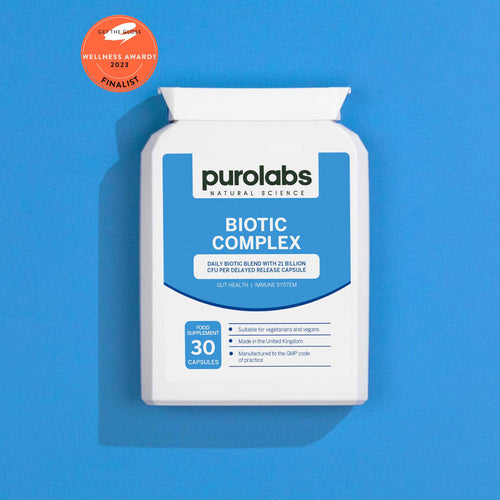Gut health continues to be the trending topic of the moment. In the sometimes political and polarising world of nutrition, gut health is the one topic us health professionals agree on to be a cornerstone of good health. The majority of studies that refer to the benefits of gut health are often referring to the gut microbiome and how it influences health and disease.
Our microbiome (or gut flora) is a complex and fascinating ecosystem of varying microorganisms which live together in symbiosis or competition for human ‘real estate’. Microorganisms include bacteria, archaea, fungi and various viruses which outnumber human cells by 10 to 11. We as humans are, theoretically, more bacteria than human; a strange but intriguing concept.
Here are a few fascinating facts about the human microbiome2:
-
The microbiome is now being considered as a separate organ to the digestive tract, significantly influencing our metabolism and immune function.
-
The majority of our immune cells live in our gut lining.
-
We have approximately 100 trillion microbes representing over 5,000 species living in our gut.
-
Faecal transplants are a relatively new and experimental health technology, in which the stool of a healthy person is implanted in the bowel of an unhealthy person to help improve their microbiome diversity and overall health.
Whilst gut health is at the forefront of health science with new discoveries being made daily, we still know relatively little about the microbiome. The sheer breadth and capacity of the human microbiome makes it complex and tricky to navigate. We will continue to uncover new discoveries about the gut in the not-too-distant future which will likely change how we see health care.
We know from various studies to date that although the gut and specifically, our microbiome isn’t fully understood, it has been established that it is vital for overall health and wellness. An imbalanced microbiome aka a higher ratio of ‘bad’ to ‘good’ gut bugs can lead to various health symptoms and disease states.
If you can do one thing today to improve your health, it is to invest in your gut health. A great starting point is to consider taking our biotic complex, which contains 15 live bacterial strains and 21 billion gut-friendly organisms, helping to repopulate your gut with health-giving life.

Biotic Complex
Now that we’ve covered what we know (and more what we don’t know) about the human microbiome, let’s discuss a few critical evidence-backed health benefits that derive from a healthy gut:
Skin Health
The gut and skin are intrinsically linked via the gut-skin axis3, in which inflammation produced by an imbalanced and unhappy microbiome can make its way up and out of the skin, resulting in rashes, acne, eczema and general irritation and congestion.
Common auto-immune skin conditions like atopic dermatitis, scleroderma and psoriasis can be linked back to an imbalanced gut flora, therefore it is imperative if you have a skin condition to look at supporting your gut function4.
Hormone Health
Oestrogen is metabolised and regulated by your good gut bugs. Our microbiome infact, has been shown to affect the levels of sex hormones through its interactions with bacteria metabolites, chronic inflammation and hormonal nerve axes5.
I regularly recommend fibre to peri- and menopausal women for this reason. Good bacteria feed off of fibre in order to populate and thrive. Therefore, a high fibre diet will help with oestrogen metabolism. This is key for the menopausal years, as oestrogen production slowly declines.
Obesity
Studies have shown that guts which lack diversity in their microbiome are more at risk of obesity. One potential reason for the link is the ability of good bacteria to efficiently digest carbohydrates better6. Individuals with common diseases associated with obesity such as type 2 diabetes may benefit from growing and diversifying their microbiome.
Mood
We often refer to our gut as the second brain, and for good reason.
A two-way communication pathway between the brain and microbiota is called the gut-brain axis. This series of interconnected channels link the enteric (gut) to the nervous system (brain). The system allows the brain to influence digestive function and the gut in turn to influence mood, cognition and mental health7.
Inflammation as a by-product of an unhealthy microbiome has been shown to increase the risk of mood disorders, therefore considering supporting microbiome health may help to improve mood and wellbeing8.
Immunity
As mentioned, the majority (70%) of our immune cells live in our gut lining, making our gut health imperative for good immune health.
Studies have even shown that antibiotics in infancy and childhood has been shown to affect immune health and lead to an increased risk of auto-immune conditions. Antibiotics, particularly chronic use of antibiotics has been associated with a reduction in microbiome diversity and function. Antibiotics role is to ‘kill’ off pathogenic organisms in the gut. However broad-spectrum antibiotics, which are generally prescribed, kill off both good and bad bacteria, leaving the environment or ‘terrain’ of the gut vulnerable to an overgrowth of pathogenic bacteria9.
It may be useful to consider your microbiome as a garden which requires soil (prebiotics) for plants to grow. A beautiful garden requires various species to thrive, and a neglected gut can lead to weeds aka pathogenic bacteria room to grow.
Digestive Function
There is evidence to suggest that those with digestive disorders such as IBS and IBD have a significantly lower microbiota diversity than those with healthy gut function10. Individuals with IBD have inflammation which has led to a structural impact on their digestive system which can be a result of an imbalance between beneficial and harmful bacteria, which promotes said inflammation.
A healthy microbiome has also been shown to improve nutrient digestion and absorption which is absolutely essential for our overall health, with nutrient deficiencies being a key risk for individuals with poor microbiome health11.
An unhealthy microbiome can also perpetuate common gastrointestinal symptoms like bloating, gas, constipation and diarrhoea, which can at best be inconvenient and at worst significantly affect quality of life.
Whilst microbiome health is likely a clear component which impacts digestive health, as the gut is complex and vast, if you are experiencing gut-related issues, do speak to a health professional or book an appointment with me to receive structured guidance and support.
As outlined, the gut and specifically microbiome, is important for many aspects of health. Whilst we don’t know all there is to know about the gut, we can safely say that from what we know so far, the gut is central to keeping us healthy. Many systems in our body from our hormones to our brain health and even our metabolic health can all be linked to our microbiome health. Keeping a diverse and thriving microbiome is a sure-fire way to boost general health and wellbeing.





















